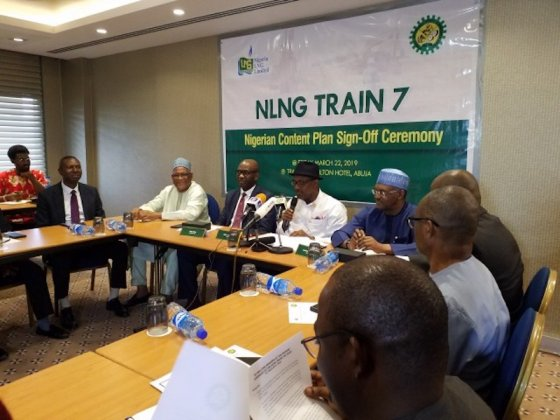- Saves $20 billion in new revenues, creates over 12,000 new jobs
More facts have emerged on the decision by President Muhammadu Buhari to order the release of the former National Security Adviser, Col. Sambo Dasuki and activist/publisher, Omoyele Sowore from detention on December 24.
The failure of the government to obey court orders was beginning to impact foreign investment into Nigeria, especially the final investment decision on NLNG Train 7 which had taken 10 years to arrive at and which would earn Nigeria over $20 billion in new annual revenues and create over 12,000 new jobs.
That final signing was almost delayed yet again as the IOCs and investment partners with Nigeria were beginning to develop cold feet over the failure of the Department of State Security, DSS, to obey court orders, expressing concern that they could not be signing agreements with a government that does not comply with rule of law. The NLNG train 7 had crossed many milestones which include the approval of its Engineering Design, and the Critical Gas Supply Agreement with gas producers on December 13.
In fact, Shell executives at the Hague were growing concerned at the international criticisms of the Nigeria government as they did not want to be caught in another Ken Saro Wiwa scenario when the government of General Sani Abacha, a government over which they had absolutely no influence executed the Ogoni Nine which badly affected Shell’s global reputation and financial standing. A top executive of one of the IOCs who preferred anonymity stated that “Shell did not want a repeat of the Saro Wiwa experience.”
To stem the growing unease in the international community over adherence to rule of law, President Muhammadu Buhari was said to have ordered his Attorney General, Abubakar Malami to ensure that all court orders are complied with.
The failure of the government to observe rule of law particularly in the light of what transpired in court during Sowore’s trial when DSS operatives invaded the court premises in an attempt to re-arrest him caused an international uproar. The reaction of the International Oil Companies, IOCs, convinced the government that the business community took obedience to court orders and the primacy of the rule of very seriously in their investment decisions. Added to that was the intense pressure mounted by the human rights community, the six US lawmakers who issued statements and wrote to the AGF on the need to obey court orders and free Sowore and other detainees. Also driving this message were most of the western embassies- with the US taking the lead through its Department of State issuing statements on the need to comply with valid court orders. The EU, UK and others also stressed this message to the federal government.
Diplomatic sources told our correspondent that the new US Ambassador to Nigeria Mary Beth Leonard emphasized the importance of rule of law in conversations with government officials as soon as he touched down in the country. It suddenly dawn on the government that attracting the much needed investors in the circumstance was going to be very difficult, this made President Buhari to order their release.
The IOCs made it clear that having a free judiciary and a Federal Government that obeys court orders weigh heavily in their investment decisions.
According to an inside source close to the IOCs who partners in the NLNG project “had begun to express concern about the government’s attitude to rule of law. They wondered how a government that does not obey court orders could guarantee the safety and security of their investments if it routinely disobeys court orders. They made it clear that obedience to court orders and rule of law were central to investor confidence and where that was lacking would only scare away investors.”
The Nigerian National Petroleum Corporation (NNPC) and other shareholders of the Nigeria Liquefied Natural Gas Limited (NLNG) which include Shell, Total and Eni on Friday announced the Final Investment Decision for the take-off of Train 7 Project of the NLNG.
The Train 7, which would deliver a significant local content in construction, production of cables, welding, valves, scaffolding, furniture, painting and medical, is expected to generate about 12,000 jobs.
The Train 7 project, which has been delayed for over 10 years, aims to increase the company’s production capacity from 22 metric tonnes per annum to about 30 MTPA, and will form part of the investment of over $10bn, including the upstream scope of the LNG value chain, according to the company.
The project follows a string of value adding decisions made under the current Group Managing Director of NNPC, Mele Kyari, whose leadership has focused on repositioning the oil and gas industry articulated in the TAPE Agenda of Transparency and Accountability and Performance Excellence.
The Train 7 will complement the existing six-trains and raise total production capacity by 35 per cent.
NLNG currently has six trains capable of producing 22 million tonnes per annum (MTPA) of LNG, and five MTPA of Natural Gas Liquids (NGLs) – that is Liquefied Petroleum Gas (LPG) or cooking gas, and condensate – from 3.5 billion standard cubic feet per day (Bcf/d) of natural gas intake.
The NLNG Train 7 FID, which was signed in the presence of the shareholders, will re-awaken activities in the nation’s oil and gas sector after years of inactivity due to project dryness.
The shareholders of the Nigeria LNG Limited include the NNPC, which holds 49 per cent shares on behalf of the federal government; Shell Gas B.V (SGBV), 25.6 per cent; Total Gaz Electricite Holdings France, 15 per cent stake; and Eni International (N.A) N.V.S.a.r.l, with 10.4 per cent stake.
However, with this development, companies and workers will be dep loyed to site to deliver the project that has been adjudged highly significant to the country’s status as a major player in the global gas market as well as to the economic development of the nation.
Earlier in March, the federal government and the shareholders had signed the Nigerian Content Plan (NCP) worth $1 billion to facilitate the actualisation of the project.
Stakeholders and industry operators have been longing for the commencement of activities in the train 7 to enable Nigeria begin reaping its short and long term benefits.
According to the Managing Director of NLNG Limited, Mr. Tony Attah, “train 7 is the next big deal for Nigeria. Train 7 is real; Train 7 is here. If you come to Bonny Island today, you will see that early site work had commenced and we are 97 percent prepared, just waiting to take that Final Investment Decision (FID).”
He added: “We co-created the Nigerian Content Plan, working in harmony with the agency just to understand the interpretation of the law and then co-creating how we comply. Overall, it’s all about consolidation and co-creating the future. I am proud to say in March 2019, we signed off the Nigerian Content Plan for Train 7 project, delivering 100 percent Nigerian content in construction, production of cables, welding, valves, scaffolding, furniture, painting and medical. It is going to be 55 percent of in-country engineering and procurement man-hours.”
The NNPC GMD indicated that the FID ceremony was a monumental accomplishment as it signifies a further demonstration of the restored and growing confidence of international oil companies of global repute in Nigeria’s petroleum Space.
Source: THISDAY













